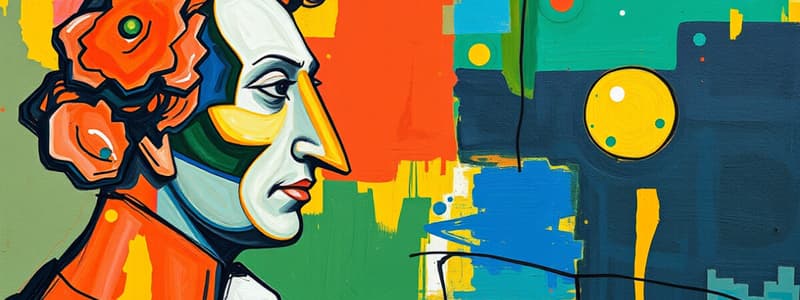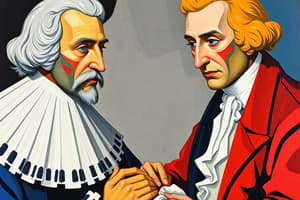Podcast
Questions and Answers
What sparked the English Civil War in the 1600s?
What sparked the English Civil War in the 1600s?
The English monarch clashed with Parliament leaders.
One of Baron de Montesquieu's key ideas was
One of Baron de Montesquieu's key ideas was
creating checks and balances.
Which three topics became a major focus of the Enlightenment?
Which three topics became a major focus of the Enlightenment?
authority, rights, responsibility.
Which statement best characterizes the ideas of John Locke?
Which statement best characterizes the ideas of John Locke?
Which movement happened last in Europe?
Which movement happened last in Europe?
Which statement best characterizes the ideas of Thomas Hobbes?
Which statement best characterizes the ideas of Thomas Hobbes?
Which statement best characterizes the ideas of Jean-Jacques Rousseau?
Which statement best characterizes the ideas of Jean-Jacques Rousseau?
Which list states events of the Enlightenment in the correct order?
Which list states events of the Enlightenment in the correct order?
The Enlightenment occurred during
The Enlightenment occurred during
The Enlightenment thinkers questioned traditional ideas about
The Enlightenment thinkers questioned traditional ideas about
The major focus of the Enlightenment were these three things
The major focus of the Enlightenment were these three things
The movement that happened last in Europe was
The movement that happened last in Europe was
This sparked the English Civil War in the 1600's
This sparked the English Civil War in the 1600's
How did the English Civil War affect the Enlightenment?
How did the English Civil War affect the Enlightenment?
English thinkers rejected the concept of
English thinkers rejected the concept of
Thomas Hobbes
Thomas Hobbes
The statement that best characterizes the ideas of T. Hobbes
The statement that best characterizes the ideas of T. Hobbes
In John Locke's Second Treatise of Government, the quote supports Locke's idea that
In John Locke's Second Treatise of Government, the quote supports Locke's idea that
John Locke's ideas are best characterized by
John Locke's ideas are best characterized by
A difference between Hobbes and Locke was that
A difference between Hobbes and Locke was that
The statement that best characterizes the ideas of Jean-Jacques Rousseau is
The statement that best characterizes the ideas of Jean-Jacques Rousseau is
The events of the Enlightenment
The events of the Enlightenment
Baron De Montesquieu was an Enlightenment philosopher from what country?
Baron De Montesquieu was an Enlightenment philosopher from what country?
One of Baron de Montesquieu's key ideas was
One of Baron de Montesquieu's key ideas was
An effect of the Enlightenment in the 1700's was
An effect of the Enlightenment in the 1700's was
In France, philosophes discussed Enlightenment ideas in
In France, philosophes discussed Enlightenment ideas in
The political effects of the Enlightenment was that
The political effects of the Enlightenment was that
Many Enlightenment ideas were incorporated into
Many Enlightenment ideas were incorporated into
1600's and 1700's
1600's and 1700's
They questioned ideas about government.
They questioned ideas about government.
Authority, rights, and responsibility.
Authority, rights, and responsibility.
The Enlightenment
The Enlightenment
The English monarch clashed with Parliament leaders.
The English monarch clashed with Parliament leaders.
The English Civil War caused many people to question the role of government, which sparked the imagination of Enlightenment thinkers.
The English Civil War caused many people to question the role of government, which sparked the imagination of Enlightenment thinkers.
A system of government in which a ruler holds total power.
A system of government in which a ruler holds total power.
Absolutism
Absolutism
The Leviathan
The Leviathan
People are naturally selfish and violent.
People are naturally selfish and violent.
He believed that people had the natural ability to govern their own affairs and to look after the welfare of society. He favored the idea of self-government.
He believed that people had the natural ability to govern their own affairs and to look after the welfare of society. He favored the idea of self-government.
People are naturally reasonable.
People are naturally reasonable.
Hobbes believed life without government was difficult, while Locke believed people have the right to rebel.
Hobbes believed life without government was difficult, while Locke believed people have the right to rebel.
A French political philosopher whose major work, The Spirit of Laws, was a major contribution to political theory.
A French political philosopher whose major work, The Spirit of Laws, was a major contribution to political theory.
He wanted to create checks and balances.
He wanted to create checks and balances.
They are ways to make sure no one has too much power.
They are ways to make sure no one has too much power.
He was an Enlightenment thinker who wrote The Social Contract which said that government is a contract between rulers and the people.
He was an Enlightenment thinker who wrote The Social Contract which said that government is a contract between rulers and the people.
Governments create unequal societies.
Governments create unequal societies.
The English Civil War comes to an end. Locke builds on the ideas of Hobbes. Montesquieu publishes Spirit of Laws. Rousseau publishes The Social Contract.
The English Civil War comes to an end. Locke builds on the ideas of Hobbes. Montesquieu publishes Spirit of Laws. Rousseau publishes The Social Contract.
Salons
Salons
There was a rise in support for representative government.
There was a rise in support for representative government.
Some monarchs embraced new ideas from the movement.
Some monarchs embraced new ideas from the movement.
The founding documents for the United States.
The founding documents for the United States.
Study Notes
Overview of the Enlightenment
- The Enlightenment spanned the 1600s to 1700s, influencing modern thought and political theory.
- It mainly focused on three core topics: authority, rights, and responsibility.
- The movement emerged as thinkers began to question traditional ideas about government and authority.
Key Figures and Ideas
-
Thomas Hobbes:
- Authored The Leviathan in 1651.
- Characterized people as inherently selfish and violent, advocating for strong authoritarian rule.
-
John Locke:
- Argued that people are naturally reasonable and capable of self-governance.
- Introduced the concept of a social contract that preserves and enlarges freedom.
- Believed that individuals have the right to rebel against unjust governments.
-
Baron de Montesquieu:
- Proposed the idea of checks and balances to prevent any one branch of government from gaining too much power.
- Wrote The Spirit of Laws, contributing significantly to political theory.
-
Jean-Jacques Rousseau:
- Criticized governments for creating unequal societies.
- Authored The Social Contract, expressing that government derives its authority from the governed.
Events Leading to the Enlightenment
- The English Civil War sparked debates about governance, leading thinkers to challenge existing political structures and ideologies.
- The sequence of pivotal events includes the conclusion of the English Civil War, the development of Locke's ideas, Montesquieu’s publication, and Rousseau's writings.
Political Implications
- The Enlightenment encouraged the rejection of absolutism, promoting the rise of representative government and more democratic political structures.
- Some monarchs began to incorporate Enlightenment concepts, altering their governance approaches.
Social and Cultural Aspects
- In France, salons became popular venues for philosophes to discuss and spread Enlightenment ideas, fostering intellectual exchange.
- Many Enlightenment principles were later reflected in the founding documents of the United States, indicating their lasting impact on modern governance.
Summary of Key Concepts
- Authority: Examined the nature of political power and its rightful exercise.
- Rights: Emphasized individual freedoms and human rights as central to political theory.
- Responsibility: Highlighted the obligation of governments to serve the welfare of the people and uphold social contracts.
Studying That Suits You
Use AI to generate personalized quizzes and flashcards to suit your learning preferences.
Description
Test your understanding of key concepts from the Enlightenment period with these flashcards. Explore pivotal ideas that shaped modern thought, including political philosophies, civil rights, and the impact of the English Civil War. Perfect for students diving into this influential era in history.




